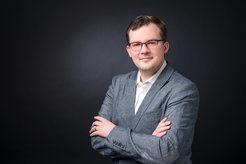Philip Moll joins MPSD as new director

Moll studies quantum materials on the microscale, with a particular focus on topological metals, unconventional superconductors and other strongly correlated electron systems. He is developing new techniques to produce high-quality crystalline microstructures for electrical transport, magnetization or heat conductivity measurements.
“My team and I investigate how the shape and function of complex electronic metals are connected on the smallest scales,” explains Moll. “To this end we use focused ion beams to cut metallic and semi-metallic crystals on the sub-micrometer scale and then study their quantum mechanical transport properties. The aim of ‘quantum materials’ research is the creation of materials and structures which display strong quantum mechanical and many-body phenomena, so that these can be used for future technologies.”
Philip Moll completed his Doctor of Sciences at ETH Zurich, Switzerland, in 2012, where he worked as a postdoctoral researcher until 2014. He then pursued his research at UC Berkeley, USA, until 2016, when he joined the MPI for Chemical Physics of Solids as leader of the research group Physics of Microstructured Quantum Matter. In 2018 he became Assistant Professor at the Institute of Materials at the EPFL, where he leads the Laboratory of Quantum Materials.
Moll is a recipient of the Nicholas Kurti Science Prize (2018), the ABB Award of the Swiss Physical Society (2014) and was selected as World Economic Forum Young Scientist in 2020. He also received an ERC Starting Grant in 2017 and a Professorial Fellowship from the Swiss National Science Foundation in 2018.
Moving to Hamburg as an MPSD director is an exciting step, says Moll: “First of all, I am delighted that I can bring my research to one of the most attractive physics hotspots in Germany. The energy and interdisciplinary work at the MPSD, on the DESY campus in general and in the Science City Bahrenfeld is simply contagious. As a highly technically oriented research group I see much potential here for joint projects and collaborations. Moreover, this move closes a personal circle: I was always interested in nature, but I became aware of my fascination with the connections and the structure of physics during a school-based work experience in year 8 – at DESY!”










